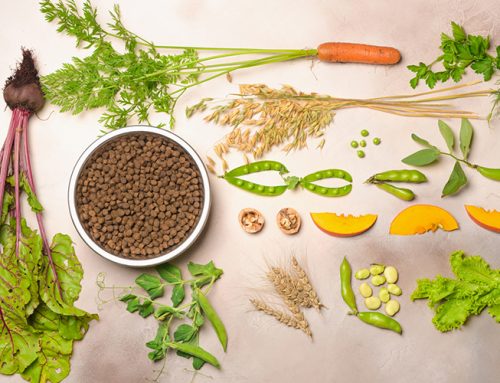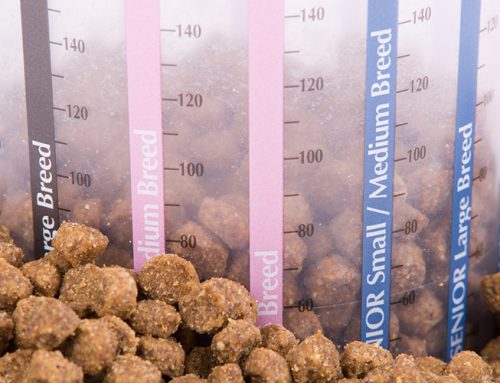How Do I Know if My Dog has a Sensitive Stomach?

Some dogs can eat nearly anything and be no worse for wear: garbage from an alley, a mysterious lump at the park — in it goes, no harm, no foul. Other dogs, not so much. They get a gurgly tummy, throw up on your favorite shoes, or get droopy and lethargic.
Upset tummies aren’t fun for the dogs or their owners, who may get stuck cleaning up something unexpected and gross if their dog has an accident or vomits.
It’s important to pay attention to the frequency of stomach upsets. All dogs get sick now and then, but some dogs have ongoing, chronic sensitive tummy issues with ongoing symptoms that manifest frequently and seemingly randomly. If your dog is sick for longer than 24 hours, check in with a vet.
What are the symptoms of a sensitive stomach?
Intermittent loose stools
Changing a dog’s food can lead to loose stools or poops that don’t look like they usually do. If your dog’s poop changes and you suspect it’s something you’ve done — new food, new supplements — give it a few days to see if it normalizes. Otherwise, it’s possible your dog has an upset digestive system.
Ongoing diarrhea
If your dog has been suffering from ongoing bouts of diarrhea and nothing you’ve done has improved the situation, it’s probably time for a visit to the vet to make sure your dog hasn’t picked up a bacterial infection. But diarrhea can also be a symptom of a sensitive tummy. Your vet may need to help determine what’s causing the issue.
Random, occasional vomiting
Everybody pukes sometimes. Dogs, especially dogs who eat random things off the sidewalk, sometimes ingest something that bothers their stomach. But if the vomiting goes from every now and then to more frequent occasions or specifically around mealtimes, maybe your dog has a sensitive tummy.
Excessive flatulence
Gas is a good indicator that your dog’s digestive system isn’t happy with whatever is going on inside.
Audible tummy sounds
If your dog has a gurgly stomach after eating, it’s possible he or she is having some issues digesting dinner. Keep an eye on this and see if other symptoms develop.
Other possible symptoms of a sensitive stomach
Loss of appetite (no one likes eating when their stomach hurts)
Eating grass
Excessive thirst
Stinky breath
Disinterest in surroundings
Excessive lip licking, or air licking
Looking uncomfortable and stretching
Pacing after eating
Burping
How do I help my dog’s stomach?
Diet plays a big part in what’s going on in your dog’s stomach. The first thing you can do to help your dog is to give her or him a simpler diet and eliminate extra treats.
It could be that your dog is suffering from food sensitivities. Once you determine the trigger foods, your dog’s stomach health will improve.
The easiest way to do this is via an elimination diet: switch to a novel (new to your dog) protein and carbohydrate combo and try it for a few weeks to see if the tummy troubles improve. Try a food with limited ingredients so you can easily keep track of what your dog is eating and how it is doing. If the symptoms improve, great! You can slowly start to provide additional proteins or carbs. Stop and backtrack if something causes negative reactions in your dog.
“Foods made from high-quality ingredients tend to be much more digestible than lower quality products,” vet Jennifer Coates writes from PetMD. “Does your dog’s food contain too much fat? Fat is more difficult to digest than carbohydrates and proteins, so a diet that contains a moderate level of fat (approximately 15 percent) is ideal.”
She also suggests looking for food that contains soluble and insoluble fiber, like beet pulp.
Provide food with limited additives (or better yet, none) or unknown animal meals, which will make it hard to determine if your dog has a food sensitivity.
Try a few things to calm your dog’s stomach
Make sure your dog can’t get into the garbage
 If you’ve caught your dog with its nose in the trash can, it might be time to dog-proof your house so it can’t eat things with the potential to upset its tummy.
If you’ve caught your dog with its nose in the trash can, it might be time to dog-proof your house so it can’t eat things with the potential to upset its tummy.
Make sure there are lids on garbage cans and that accessible cupboard doors are closed. Keep cosmetics out of reach, and the toilet bowl lid down. As much as possible, keep small things like hair elastics that might be mistaken for a treat off the ground and out of reach.
Ensure the plants in your house and yard are nontoxic, or well-fenced to keep your dog out.
You’ve made changes to diet and surroundings. Now what?
If your dog is not improving after changes to its diet, or its symptoms are getting worse, visit a vet to rule out more serious health concerns.
More serious causes of a sensitive stomach are:
Food allergies
Inflammatory bowel diseases
Poison or toxic food ingestion (in this scenario, likely your dog will be fine and suddenly sick, indicating something recent)
Parasites
Pancreatitis
Ulcers
Other medical conditions
Vomit with blood in it
Severe, acute vomiting
Blood in stool
Weakness and lethargy
Standing with a drooping head
Excessive drool





